高中英语语法知识——代词
- 格式:doc
- 大小:98.50 KB
- 文档页数:12
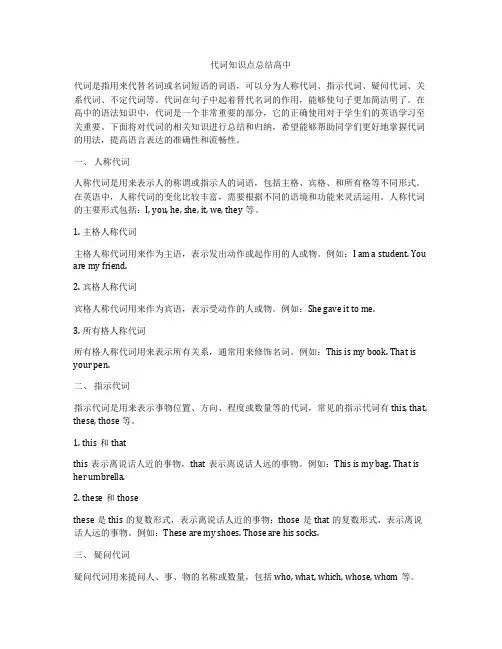
代词知识点总结高中代词是指用来代替名词或名词短语的词语,可以分为人称代词、指示代词、疑问代词、关系代词、不定代词等。
代词在句子中起着替代名词的作用,能够使句子更加简洁明了。
在高中的语法知识中,代词是一个非常重要的部分,它的正确使用对于学生们的英语学习至关重要。
下面将对代词的相关知识进行总结和归纳,希望能够帮助同学们更好地掌握代词的用法,提高语言表达的准确性和流畅性。
一、人称代词人称代词是用来表示人的称谓或指示人的词语,包括主格、宾格、和所有格等不同形式。
在英语中,人称代词的变化比较丰富,需要根据不同的语境和功能来灵活运用。
人称代词的主要形式包括:I, you, he, she, it, we, they等。
1. 主格人称代词主格人称代词用来作为主语,表示发出动作或起作用的人或物。
例如:I am a student. You are my friend.2. 宾格人称代词宾格人称代词用来作为宾语,表示受动作的人或物。
例如:She gave it to me.3. 所有格人称代词所有格人称代词用来表示所有关系,通常用来修饰名词。
例如:This is my book. That is your pen.二、指示代词指示代词是用来表示事物位置、方向、程度或数量等的代词,常见的指示代词有this, that, these, those等。
1. this和thatthis表示离说话人近的事物,that表示离说话人远的事物。
例如:This is my bag. That is her umbrella.2. these和thosethese是this的复数形式,表示离说话人近的事物;those是that的复数形式,表示离说话人远的事物。
例如:These are my shoes. Those are his socks.三、疑问代词疑问代词用来提问人、事、物的名称或数量,包括who, what, which, whose, whom等。
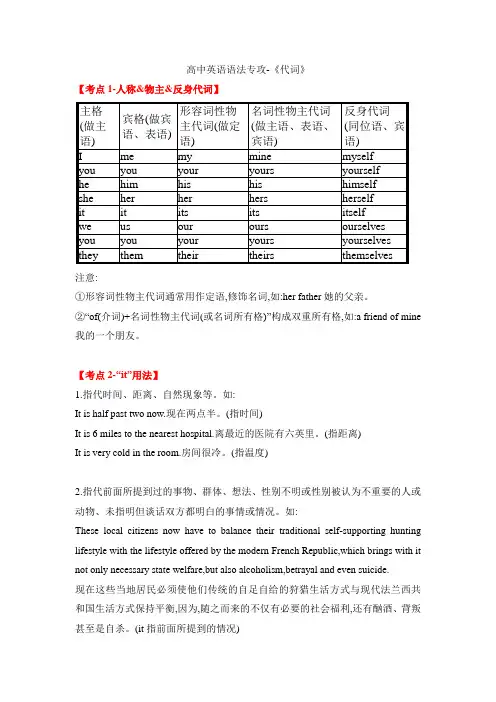
高中英语语法专攻-《代词》【考点1-人称&物主&反身代词】注意:①形容词性物主代词通常用作定语,修饰名词,如:her father她的父亲。
②“of(介词)+名词性物主代词(或名词所有格)”构成双重所有格,如:a friend of mine 我的一个朋友。
【考点2-“it”用法】1.指代时间、距离、自然现象等。
如:It is half past two now.现在两点半。
(指时间)It is 6 miles to the nearest hospital.离最近的医院有六英里。
(指距离)It is very cold in the room.房间很冷。
(指温度)2.指代前面所提到过的事物、群体、想法、性别不明或性别被认为不重要的人或动物、未指明但谈话双方都明白的事情或情况。
如:These local citizens now have to balance their traditional self-supporting hunting lifestyle with the lifestyle offered by the modern French Republic,which brings with it not only necessary state welfare,but also alcoholism,betrayal and even suicide.现在这些当地居民必须使他们传统的自足自给的狩猎生活方式与现代法兰西共和国生活方式保持平衡,因为,随之而来的不仅有必要的社会福利,还有酗酒、背叛甚至是自杀。
(it指前面所提到的情况)—Who’s that at the door?—It is the milkman.——门口那人是谁?——是送奶工。
(it指代性别不明或性别被认为不重要的人)—I’ve broken a plate.我打碎了一个盘子。
—It(=Breaking the plate) doesn’t matter.没关系。
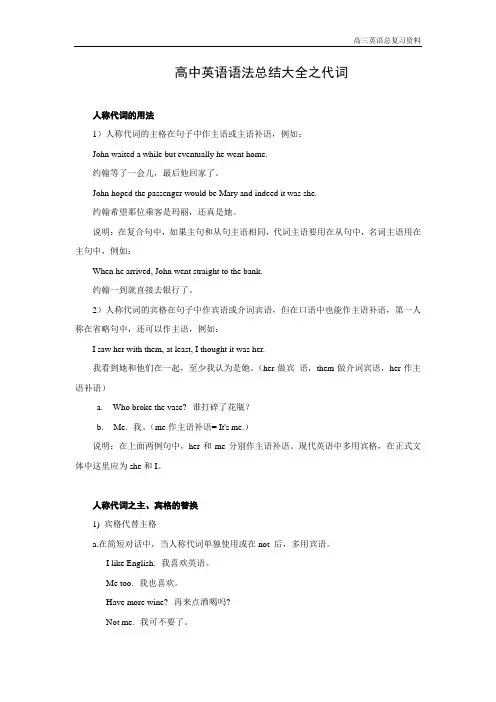
高中英语语法总结大全之代词人称代词的用法1)人称代词的主格在句子中作主语或主语补语,例如:John waited a while but eventually he went home.约翰等了一会儿,最后他回家了。
John hoped the passenger would be Mary and indeed it was she.约翰希望那位乘客是玛丽,还真是她。
说明:在复合句中,如果主句和从句主语相同,代词主语要用在从句中,名词主语用在主句中,例如:When he arrived, John went straight to the bank.约翰一到就直接去银行了。
2)人称代词的宾格在句子中作宾语或介词宾语,但在口语中也能作主语补语,第一人称在省略句中,还可以作主语,例如:I saw her with them, at least, I thought it was her.我看到她和他们在一起,至少我认为是她。
(her做宾语,them做介词宾语,her作主语补语)a. -- Who broke the vase?--谁打碎了花瓶?b. -- Me.--我。
(me作主语补语= It's me.)说明:在上面两例句中,her和me分别作主语补语。
现代英语中多用宾格,在正式文体中这里应为she和I。
人称代词之主、宾格的替换1) 宾格代替主格a.在简短对话中,当人称代词单独使用或在not 后,多用宾语。
---- I like English.--我喜欢英语。
---- Me too.--我也喜欢。
---- Have more wine?--再来点酒喝吗?---- Not me.--我可不要了。
b.在表示比较的非正式的文体中,常用宾格代替主格。
但如果比较状语的谓语保留,则主语只能用主格。
He is taller than I/me.He is taller than I am.2) 主格代替宾格a. 在介词but,except 后,有时可用主格代替宾格。
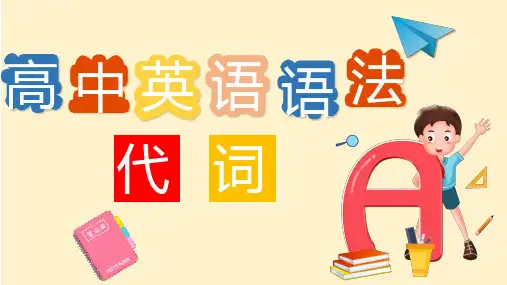
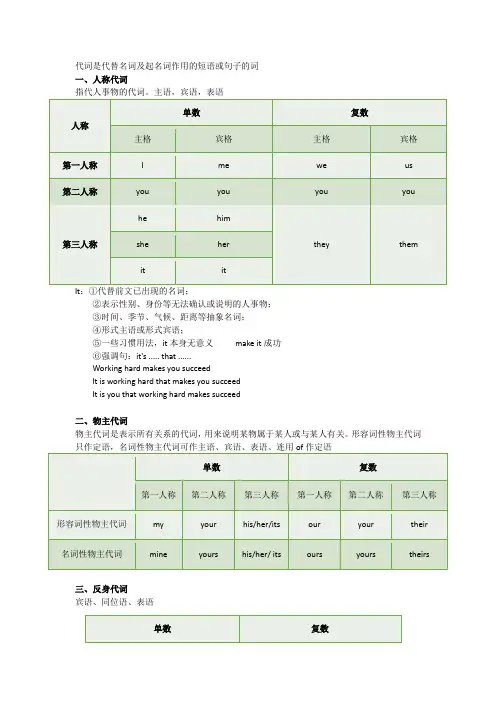
代词是代替名词及起名词作用的短语或句子的词一、人称代词指代人事物的代词。
主语,宾语,表语It:①代替前文已出现的名词;②表示性别、身份等无法确认或说明的人事物;③时间、季节、气候、距离等抽象名词;④形式主语或形式宾语;⑤一些习惯用法,it本身无意义make it成功⑥强调句:it's ..... that ......Working hard makes you succeedIt is working hard that makes you succeedIt is you that working hard makes succeed二、物主代词物主代词是表示所有关系的代词,用来说明某物属于某人或与某人有关。
形容词性物主代词只作定语,名词性物主代词可作主语、宾语、表语、连用of作定语三、反身代词宾语、同位语、表语1、作宾语时,主语和宾语是同一个/群人he enjoy himself只能接反身代词作宾语的特殊及物动词:absent-------absent oneself from activity/...Avail---------avail oneself of 利用Pride---------pride oneself on (doing) sth自豪于2、作表语时,反身代词用来描述感觉、情绪和状态。
Be oneself feel oneself3、作主语或宾语的同位语时,表‘亲自’,用于加强语气,放在被修饰名词后或句末一个名词(或其它形式)对另一个名词或代词进行解释或补充说明,这个名词(或其它形式)就是同位语。
同位语与被它限定的词的格式要一致,并常常紧挨在一起。
同位语除表示其同位成分的全部意义外,还可以表示部分意义。
(考点主要是同位语从句,后续展开)常见用法:by oneself 亲自;独自enjoy oneself 玩得开心come to oneself恢复知觉dress oneself 自己穿衣服devote oneself to致力于speak to oneself 自言自语teach oneself 自学help oneself to 随便吃in oneself 本身固有四、不定代词不明确指代某个人、某个事物、某些人、某些事物的代词(1)some、any的用法(2)few,a few,little,a little的用法(3)other,the other,others,the others,another的用法(4)all,both,none,either,neither的用法注:①each可用干两者、三者或三者以上,而every只用干三者或三者以上②all和each既可单独使用,也可后接名词,还可后接of短语;而every后必须接名词,既不能单独使用也不能后接of短语③不定代词all,every 等与 not 连用时构成部分否定;若要表示完全否定,则需换用 none,neither, no one等。
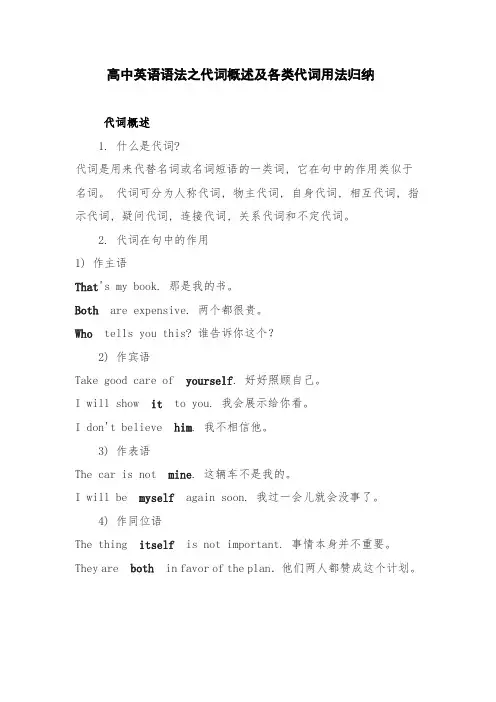
高中英语语法之代词概述及各类代词用法归纳代词概述1. 什么是代词?代词是用来代替名词或名词短语的一类词, 它在句中的作用类似于名词。
代词可分为人称代词, 物主代词, 自身代词, 相互代词, 指示代词, 疑问代词, 连接代词, 关系代词和不定代词。
2. 代词在句中的作用1) 作主语That's my book. 那是我的书。
Both are expensive. 两个都很贵。
Who tells you this? 谁告诉你这个?2) 作宾语Take good care of yourself. 好好照顾自己。
I will show it to you. 我会展示给你看。
I don't believe him. 我不相信他。
3) 作表语The car is not mine. 这辆车不是我的。
I will be myself again soon. 我过一会儿就会没事了。
4) 作同位语The thing itself is not important. 事情本身并不重要。
They are both in favor of the plan.他们两人都赞成这个计划。
5) 作呼语You stand here and wait for the bus. 你站在这儿等公车吧。
Be patient, everyone. 大家都耐心点吧。
6) 作定语That's my glasses. 那是我的眼镜。
I'll buy that umbrella.人称代词1. 人称代词的词汇a) 人称代词主格 (在句中作主语)单数第一人称: I (我)单数第二人称: you (你)单数第三人称: he, she, it (他,她,它)复数第一人称: we(我们)复数第二人称: you(你们)复数第三人称: they (他们/她们/它们)b) 人称代词宾格 (在句中作宾语)单数第一人称: me (我)单数第二人称: you (你)单数第三人称: him, her, it(他,她,它)复数第一人称: us(我们)复数第二人称: you(你们)复数第三人称: them (他们/她们/它们)2. 人称代词在句中的作用1) 作主语I am a student. 我是一名学生。
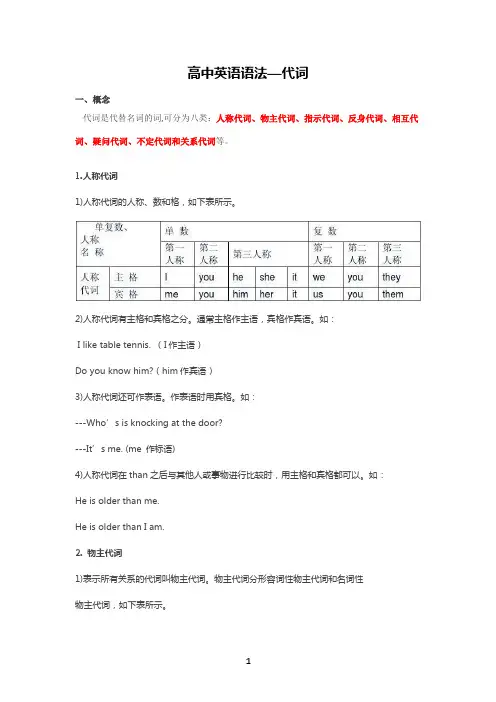
高中英语语法—代词一、概念代词是代替名词的词,可分为八类:人称代词、物主代词、指示代词、反身代词、相互代词、疑问代词、不定代词和关系代词等。
1.人称代词1)人称代词的人称、数和格,如下表所示。
2)人称代词有主格和宾格之分。
通常主格作主语,宾格作宾语。
如:I like table tennis. (I作主语)Do you know him?(him作宾语)3)人称代词还可作表语。
作表语时用宾格。
如:---Who’s is knocking at the door?---It’s me. (me 作标语)4)人称代词在than之后与其他人或事物进行比较时,用主格和宾格都可以。
如:He is older than me.He is older than I am.2. 物主代词1)表示所有关系的代词叫物主代词。
物主代词分形容词性物主代词和名词性物主代词,如下表所示。
2)形容词性物主代词的作用相当于形容词,可在句中作定语。
例如:Our teacher is coming to see us.(our作定语)This is her pencil-box.(her作定语)3)名词性物主代词的作用相当于名词,在句中可用作主语、宾语和表语。
Our school is here, and theirs is there.(theirs作主语)--- Is this English-book yours? (yours作表语)--- No. Mine is in my bag.(mine作主语)I've already finished my homework. Have you finished yours?(yours作宾语)3. 指示代词指示代词包括:this,that,these,those。
1) this和these一般用来指在时间或空间上较近的事物或人,that和those则指时间和空间上较远的事物或人,例如:This is a pen and that is a pencil.We are busy these days.In those days the workers had a hard time.2)有时that和those指前面讲到过的事物,this 和these则是指下面将要讲到的事物,例如:I had a cold. That's why I didn't come.What I want to say is this:pronunciation is very important in learning English.3)有时为了避免重复提到的名词,常可用that或those代替,例如:Television sets made in Beijing are just as good as those made in Shanghai.4)this 在电话用语中代表自己,that 则代表对方。
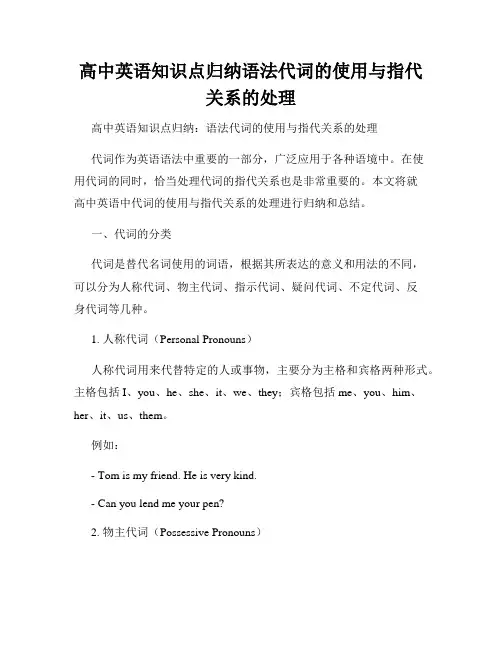
高中英语知识点归纳语法代词的使用与指代关系的处理高中英语知识点归纳:语法代词的使用与指代关系的处理代词作为英语语法中重要的一部分,广泛应用于各种语境中。
在使用代词的同时,恰当处理代词的指代关系也是非常重要的。
本文将就高中英语中代词的使用与指代关系的处理进行归纳和总结。
一、代词的分类代词是替代名词使用的词语,根据其所表达的意义和用法的不同,可以分为人称代词、物主代词、指示代词、疑问代词、不定代词、反身代词等几种。
1. 人称代词(Personal Pronouns)人称代词用来代替特定的人或事物,主要分为主格和宾格两种形式。
主格包括I、you、he、she、it、we、they;宾格包括me、you、him、her、it、us、them。
例如:- Tom is my friend. He is very kind.- Can you lend me your pen?2. 物主代词(Possessive Pronouns)物主代词用来表示某物归属于某人,也分为形容词性和代词性两种形式。
形容词性物主代词修饰名词,代词性物主代词可直接替代名词。
例如:- This is my book. (形容词性)- This book is mine. (代词性)3. 指示代词(Demonstrative Pronouns)指示代词用来指代离说话人或距离较近的事物。
包括this、that、these、those等形式。
例如:- This is my car. That is his car.4. 疑问代词(Interrogative Pronouns)疑问代词用来提问特定的人或事物,在句子中作主语、宾语或定语。
例如:- Who is your English teacher?- Which book do you prefer?5. 不定代词(Indefinite Pronouns)不定代词用来泛指不确定的人或事物,常见的不定代词包括somebody、anybody、something、anything等。
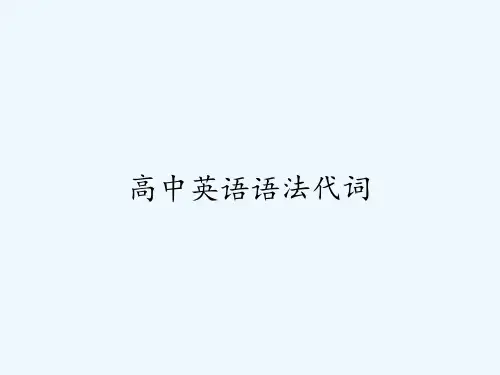
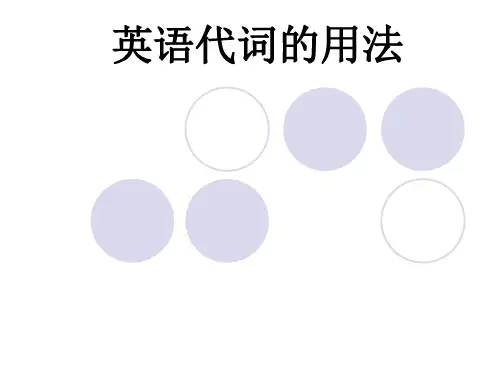
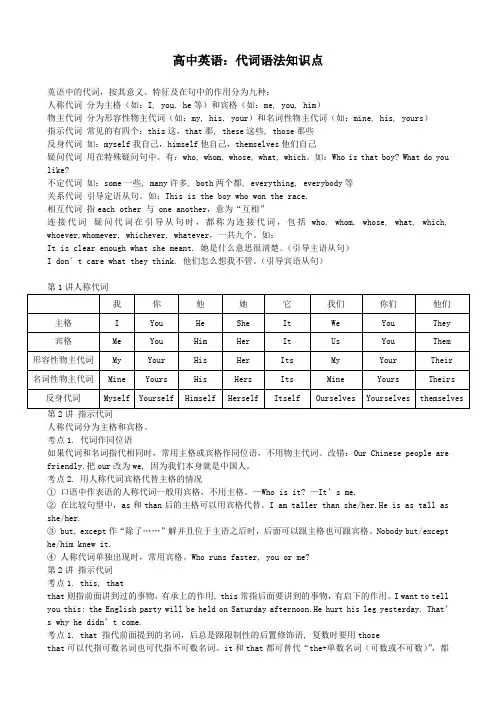
高中英语:代词语法知识点英语中的代词,按其意义、特征及在句中的作用分为九种:人称代词分为主格(如:I, you, he等)和宾格(如:me, you, him)物主代词分为形容性物主代词(如:my, his, your)和名词性物主代词(如:mine, his, yours)指示代词常见的有四个:this这,that那, these这些, those那些反身代词如:myself我自己,himself他自己,themselves他们自己疑问代词用在特殊疑问句中。
有:who, whom, whose, what, which。
如:Who is that boy? What do you like?不定代词如:some一些, many许多, both两个都, everything, everybody等关系代词引导定语从句。
如:This is the boy who won the race.相互代词指each other 与 one another,意为“互相”连接代词疑问代词在引导从句时,都称为连接代词,包括who, whom, whose, what, which, whoever,whomever, whichever, whatever,一共九个。
如:It is clear enough what she meant. 她是什么意思很清楚。
(引导主语从句)I don’t care what they think. 他们怎么想我不管。
(引导宾语从句)第1讲人称代词人称代词分为主格和宾格。
考点1. 代词作同位语如果代词和名词指代相同时,常用主格或宾格作同位语,不用物主代词。
改错:Our Chinese people are friendly.把our改为we, 因为我们本身就是中国人。
考点2. 用人称代词宾格代替主格的情况①口语中作表语的人称代词一般用宾格,不用主格。
—Who is it? —It’s me.②在比较句型中,as和than后的主格可以用宾格代替。
高中英语语法知识:代词代词(英文pronoun,简称pron.),是指代名词或一句话的一种词类。
大多数代词具有名词和形容词的功能。
英语中的代词,按其意义、特征及在句中的作用分为:人称代词、物主代词、指示代词、反身代词、相互代词、疑问代词、关系代词、连接代词、不定代词和替代词十种。
人称代词分为主格(如:I, you, he等)和宾格(如:me, you, him)物主代词分为形容性物主代词(如:my, his, your)和名词性物主代词(如:mine, his, yours)指示代词常见的有四个:this这,that那, these这些, those那些反身代词如:myself我自己,himself他自己,themselves他们自己疑问代词用在特殊疑问句中。
有:who, whom, whose, what, which。
如:Who is that boy? What do you like?不定代词如:some一些, many许多, both两个都, everything, everybody等关系代词引导定语从句。
如:This is the boy who won the race.相互代词指each other 与one another,意为“互相”连接代词疑问代词在引导从句时,都称为连接代词,包括who, whom, whose, what, which, whoever,whomever, whichever, whatever,一共九个。
如:It is clear enough what she meant. 她是什么意思很清楚。
(引导主语从句)I don’t care what they think. 他们怎么想我不管。
(引导宾语从句)替代词that,one(单数),ones(复数)。
为避免重复,在一个句子中常用替代词替代前面已经提到过的事物。
高中英语语法---代词代词分为九类:人称代词、物主代词、反身代词、相互代词、指示代词\疑问代词、连接代词、不定代词、关系代词。
大多数代词具有名词和形容词的作用。
1、人称代词(1)人称代词作主语用主格,作宾语、表语用宾格,但应注意以下情况:在比较级的句子中than、as后用主格、宾格都可以。
如:He is taller than me但在下列句中有区别。
I like Jack as much as her.=I like both Jack and her.I like Jack as much as she.=I like Jack and she likes him, too.(2)两个以上的人称代词并列,其次序排列原则:①在并列主语中,“I”总是放在最后,排列顺序为:二三一(人称)。
宾格me也一样。
You ,she and I will be in charge of the case.Mr.Zhang asked Li Hua and me to help him.②第三人称,男女两性并用,男先女后。
He and she still don’t agree to the pl an.(3)几个人称代词的特殊用法。
①we/you(口语)常用来泛指一般人。
②she可以代表国家、船只、大地、月亮等。
The “Titanic”was the largest, wasn’t she?2.物主代词(1)名词和形容词性物主代词各自的语法功能。
(2)one’s own…=...of one’s own句式的转换。
3.反身代词(1)反身代词的语法功能:宾语、表语、主语或宾语的同位语。
(2)反身代词和某些动词连有,构成固定短语。
enjoy oneself, feel oneself, make oneself at home, make oneself understood(3)反身代词还可用于某些成语中。
for oneself为自己或独立地,of oneself自然地,自动地by oneself独自地,in oneself本身性质,beside oneself喜怒哀愁至极This problem gets a chapter to itself.这个问题占了一章(独有)。
代词(一)Part1人称代词人称代词是表示"我"、"你"、"他"、"她"、"它"、"我们"、"你们"、"他们"的词。
是表示自身或人称的代词。
(::I置于Part2物主代词表示所有关系的代词叫做物主代词。
1物主代词可分为形容词性物主代词和名词性物主代词两种。
(1)形容词物主代词在句中作定语:Ilovemycountry.Isthisyourcar?(2)名词性的物主代词可用作主语,宾语,表语以及与"of"连接:物的代词。
主要的有this,that,these,those,其中this和that 为单数,these和those为复数。
指示代词在句中可作主语、宾语、表语、定语。
指示代词的用法:1this和that的用法两者的基本区别是this表近指,that表远指。
另外,当要回指上文提到的事情时,可用this或that,但是若要指下文叙述的事情,通常要用this:ShemarriedJim,andthis/thatsurprisedme.Iwanttoknowthis——Doseheloveher?2that和those的用法that和those常常用来代替已提到过的名词,以避免重复。
ThepopulationofChinaislargerthanthatofJapan.Theearsofarabbitarelongerthanthoseofafox.Part5相互代词相互代词是表示相互关系的代词,主要有who的意义为“谁”,既可以做单数,也可以指复数。
在句中主要做主语和宾语。
whom是who的宾格,在句中主要做动词宾语和介词宾语,做动词宾语时whom可与who互换使用,但作介词宾语时只能用whom;whose是who的所有格形式,意为“谁的”:Whosaidthat?Whomareyouwaitingfor?Whom/Whohaveyouchosentotakepartinthesportsmeet?Idon’tknowwhoseitis.what与whichwhich和what都指物。
高中英语语法代词归纳总结代词是英语语法中的一种词类,用于代替名词或名词短语,起到简化语言或避免重复的作用。
在高中英语学习中,掌握代词的使用非常重要,因此本文将对高中英语语法中的代词进行归纳总结。
以下是代词的不同类型及其用法:一、人称代词人称代词分为主格和宾格两种形式,用于代替人或人物。
主格人称代词用于作主语,而宾格人称代词用于作宾语或介词后的宾语。
1. 主格人称代词:I, you, he, she, it, we, they例如:- I am a student.(我是学生。
)- He is reading a book.(他正在读一本书。
)2. 宾格人称代词:me, you, him, her, it, us, them例如:- She called me yesterday.(她昨天给我打电话。
)- They invited us to their wedding.(他们邀请我们参加他们的婚礼。
)二、物主代词物主代词用于表示所属关系或所有权。
1. 形容词性物主代词:my, your, his, her, its, our, their例如:- This is my book.(这是我的书。
)- Is this your pen?(这是你的笔吗?)2. 名词性物主代词:mine, yours, his, hers, its, ours, theirs例如:- The blue car is mine.(那辆蓝色的车是我的。
)- Is this book yours or mine?(这本书是你的还是我的?)三、反身代词反身代词用于表示动作的反身或强调。
1. 单数形式:myself, yourself, himself, herself, itself例如:- I can do it myself.(我可以自己做。
)- She hurt herself while playing basketball.(她在打篮球时受伤了。
高中英语语法代词高中英语语法知识点梳理:代词代词是英语语法中一类重要的词类,用于代替句子中的名词、形容词或其他代词,起到避免重复的作用。
在高中英语语法中,代词是一个重要的考点,也是写作中需要注意的部分。
本文将详细梳理代词的相关知识点,帮助大家更好地掌握英语语法。
一、代词的种类1、人称代词:用于指代人或人类,如:I, you, he, she, it, we, they 等。
2、物主代词:用于描述物品的所有关系,如:my, your, his, her, its, our, their等。
3、反身代词:用于强调主语本身,如:myself, yourself, himself, herself, itself, ourselves, themselves等。
4、相互代词:用于表达人与人之间的相互关系,如:each other, one another等。
5、指示代词:用于指示或描述近处或远处的人或物,如:this, that, these, those等。
6、疑问代词:用于构成疑问句,如:who, what, which, whom等。
7、关系代词:用于引导关系从句,如:that, which, who, whom, whose 等。
二、代词的用法1、人称代词:在句子中作主语或宾语,替代名词、名词短语或句子。
2、物主代词:在句子中作定语,限定名词的范围或种类。
3、反身代词:在句子中作宾语或同位语,表示主语和宾语为同一人或物。
4、相互代词:在句子中作宾语或介词宾语,表示人与人之间的相互关系。
5、指示代词:在句子中作主语、宾语或表语,起指示或替代作用。
6、疑问代词:在句子中引导特殊疑问句,就某个事物、人或代词进行提问。
7、关系代词:在句子中引导关系从句,连接主句和从句,表达两者之间的关系。
三、注意事项1、代词的准确使用:在句子中选用合适的代词替代相应的名词、形容词或其他代词,避免歧义和误解。
2、代词的先行词:在使用关系从句时,要注意先行词的选择和使用,确保从句与主句之间的逻辑关系清晰。
高中英语语法知识——代词英语中的代词,按其意义、特征及在句中的作用分为九种:人称代词分为主格(如:I, you, he等)和宾格(如:me, you, him)物主代词分为形容性物主代词(如:my, his, your)和名词性物主代词(如:mine, his, yours)指示代词常见的有四个:this这,that那, these这些, those那些反身代词如:myself我自己,himself他自己,themselves他们自己疑问代词用在特殊疑问句中。
有:who, whom, whose, what, which。
如:Who is that boy? What do you like?不定代词如:some一些, many许多, both两个都, everything, everybody等关系代词引导定语从句。
如:This is the boy who won the race.相互代词指each other 与one another,意为“互相”连接代词疑问代词在引导从句时,都称为连接代词,包括who, whom, whose, what, which, whoever,whomever, whichever, whatever,一共九个。
如:It is clear enough what she meant. 她是什么意思很清楚。
(引导主语从句)I don’t care what they think. 他们怎么想我不管。
(引导宾语从句)第1讲人称代词第2讲指示代词人称代词分为主格和宾格。
考点1. 代词作同位语如果代词和名词指代相同时,常用主格或宾格作同位语,不用物主代词。
改错:Our Chinese people are friendly. 把our改为we, 因为我们本身就是中国人。
考点2. 用人称代词宾格代替主格的情况①口语中作表语的人称代词一般用宾格,不用主格。
—Who is it? —It’s me.②在比较句型中,as和than后的主格可以用宾格代替。
I am taller than she/her.He is as tall as she/her.③ but, except作“除了……”解并且位于主语之后时,后面可以跟主格也可跟宾格。
Nobody but/except he/him knew it.④人称代词单独出现时,常用宾格。
Who runs faster, you or me?考点3. this, thatthat则指前面讲到过的事物,有承上的作用, this常指后面要讲到的事物,有启下的作用。
I want to tell you this: the English party will be held on Saturday afternoon.He hurt his leg yesterday. That’s why he didn’t come.考点4. that 指代前面提到的名词,后总是跟限制性的后置修饰语, 复数时要用thosethat可以代指可数名词也可代指不可数名词。
it和that都可替代“the+单数名词(可数或不可数)”,都是特指,但it指前面提到的“同一”事物,而that是指前面提到的“同类”事物。
第3讲不定代词(一)没有明确指定代替任何特定名词或形容词的词叫做不定代词,常用的不定代词有:all, any, another, both, each, every, either, every, few, little, many, much, no, none, neither, one, other, some以及由some, any, no, very 和body, one, thing 构成的复合词在指代时,one可以替换为:a+名词, 而it指特定的某一个,相当于the+名词。
在the one和the ones中,one指代前面提到的可数名词。
①从数量上:each用于两个或两个以上的人或物,而every用于三个或三个以上的人或物。
也就是说,只有两个时,必须用each, 三个及三个以上时,用each 和every都行。
Each/Every student has a computer.②从意义上:each侧重于个体,强调“每一个”,而every侧重于整体,强调“全部”。
Each student has a computer. 每个学生都有台电脑。
Every student has a computer. 所有的学生都有电脑。
③从词性上:every只能作形容词,而each可作代词、形容词和副词。
Each boy has eaten one apple. (each为形容词)Each of them has eaten one apple. (each为代词)They each have eaten one apple. (each为代词,作同位语)They have eaten one apple each. (each为副词)改错:①There are many tall trees on every side of the road.②Every of the students in our class has a dictionary.改为:①把every改为each, 因为路只有两条边,而every用于三者及三者以上。
②把Every 改为Each,或在Every后加one。
any, either表示“任何一个”时的区别① any表示“任何”的意思, 用于三者及三者以上。
Any child can do that.(定语)You may take any of them.(宾语)② either是“两者中任何一个”的意思,可修饰或代替单数可数名词。
如:Here are two pens. You may take either of them. (宾语)③ each指两者时可与either互换。
如:There are many trees on either/each side of the road.neither, both与all, none(both与all表示部分否定)① both用于否定句,表示部分否定;表示完全否定时,用neither。
如:Both of us are not teachers.我们俩并不都是教师。
Neither of us is a teacher. 我们俩都不是教师。
② all 用于否定句,表示部分否定,完全否定用none。
如:Not all the ants go out for food.(or: All the ants don’t go out for food.)并不是所有的蚂蚁都出去寻找食物。
None of the money is mine.这钱一分也不是我的。
③另外,neither是“两者中没有一个”的意思,可以作形容词,修饰或代替单数可数名词,它所修饰的名词用单数形式,后面的谓语也用单数形式。
如Neither boy knows French.another, other, others, the other, the others,the rest的区别①“the other +名词复数” (或用the others) 表示“其余的全部……”;“other + 复数名词(或用others)”泛指“其他的(别的)人或物”(并不有意强调全部)。
如:Five of the pencils are red, the others (the other pens) are yellow.Some are singing, and others are dancing.(others泛指其余的,指其余的绝大部分。
暗示可能有极少数既没唱歌也没跳舞。
如果用the others则指剩余的全部,表示其余的无一例外都在跳舞。
)some…,some…,some…,others…,意为“一些……一些……一些”。
② the other 强调剩下的这一个,此时只有一个;常出现在one…the other中, 用于两者之间。
如:He got two books; one is a textbook, the other is a novel.也可用于其他表示“只剩下这一个”的情况。
如:There were three boys in the classroom. One is Tom, another is John, and the other is Ken.another修饰或代替单数可数名词,用于“三个或三个以上”,指代剩下的两个或两个以上中的一个。
This coat is too dark. Please show me another.(宾语,外衣总数为三件及三件以上。
除去这个外衣之外,剩下的起码有两件;如果只剩一件的话,就要用the other。
)one … another/a second… a third…the other…常用于列举,意为“一个……一个……一个……一个,剩下的那一个”,用于三者或三者以上的排列。
③ another还可表示“再,又”。
(参看:P. 32 many more + 名词,much more + 名词,与another)④ the rest既可代替可数名词,也可代替不可数名词, 而another, other, others, the other(s)只能代替可数名词。
⑤ else只能放在复合不定代词或者疑问词后。
如:Did you see anybody else? 你还看见别的人吗?Who else was at the party? 聚会上还有谁?⑥ each other, one another(相互)。
按传统语法,each other 指两者;而one another 指三者或三者以上。
但在现代英语中,两者常可互换。
如:You should help each other (one another). 你们应该互相帮助。
We know each other’s (one another’s) weak points. 我们都彼此了解对方的缺点。
⑦ one after another(一个接一个), 如:I’m not surprised he’s feeling ill—he was eating one ice-cream after another!⑧“any other +单数名词”(别的/ 其他的任何一个)Shanghai is larger than any other city in China.one way or another “以某种方式”;“无论如何”。